Management and Operations at Tesco: Leadership Analysis Report
VerifiedAdded on 2022/12/28
|14
|4338
|80
Report
AI Summary
This report provides a detailed analysis of leadership and management practices within Tesco, a multinational retail organization. The assignment begins by defining and comparing the distinct roles and characteristics of leaders and managers, highlighting their responsibilities in achieving organizational goals. The main body delves into the practical application of these roles in various situational contexts, such as launching new stores and hiring employees, demonstrating how leaders and managers adapt to changing business environments. The report then explores and applies key leadership theories and models, including situational, systems, and contingency leadership, evaluating their respective strengths and weaknesses. Furthermore, it examines operational management methods, assessing the roles of leaders and managers in enhancing efficiency and achieving organizational objectives. Finally, the report considers the impact of external factors on operational management and decision-making, providing a comprehensive overview of leadership and management in a dynamic business setting. The content is contributed by a student and is available on Desklib, a platform offering AI-based study tools.
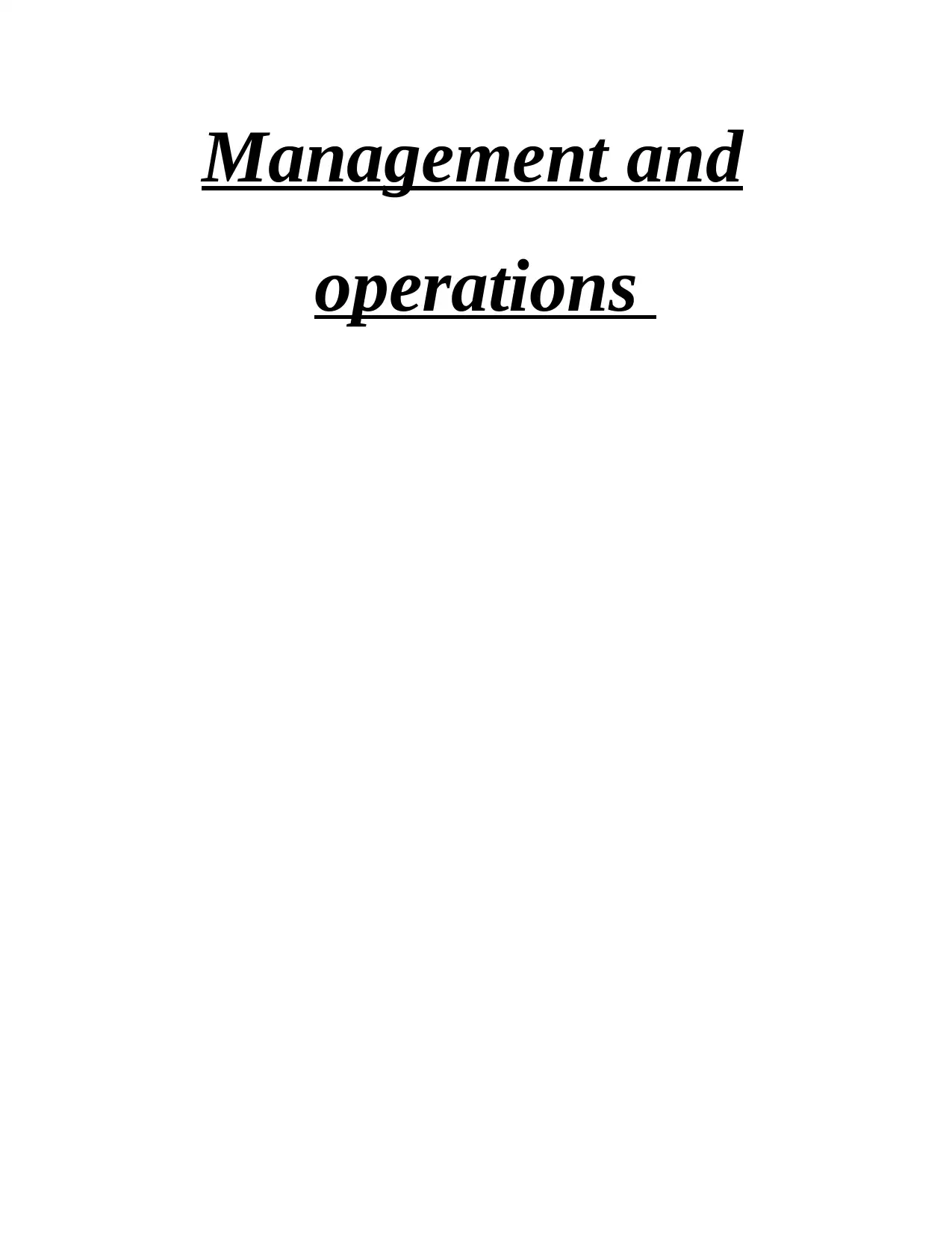
Management and
operations
operations
Paraphrase This Document
Need a fresh take? Get an instant paraphrase of this document with our AI Paraphraser
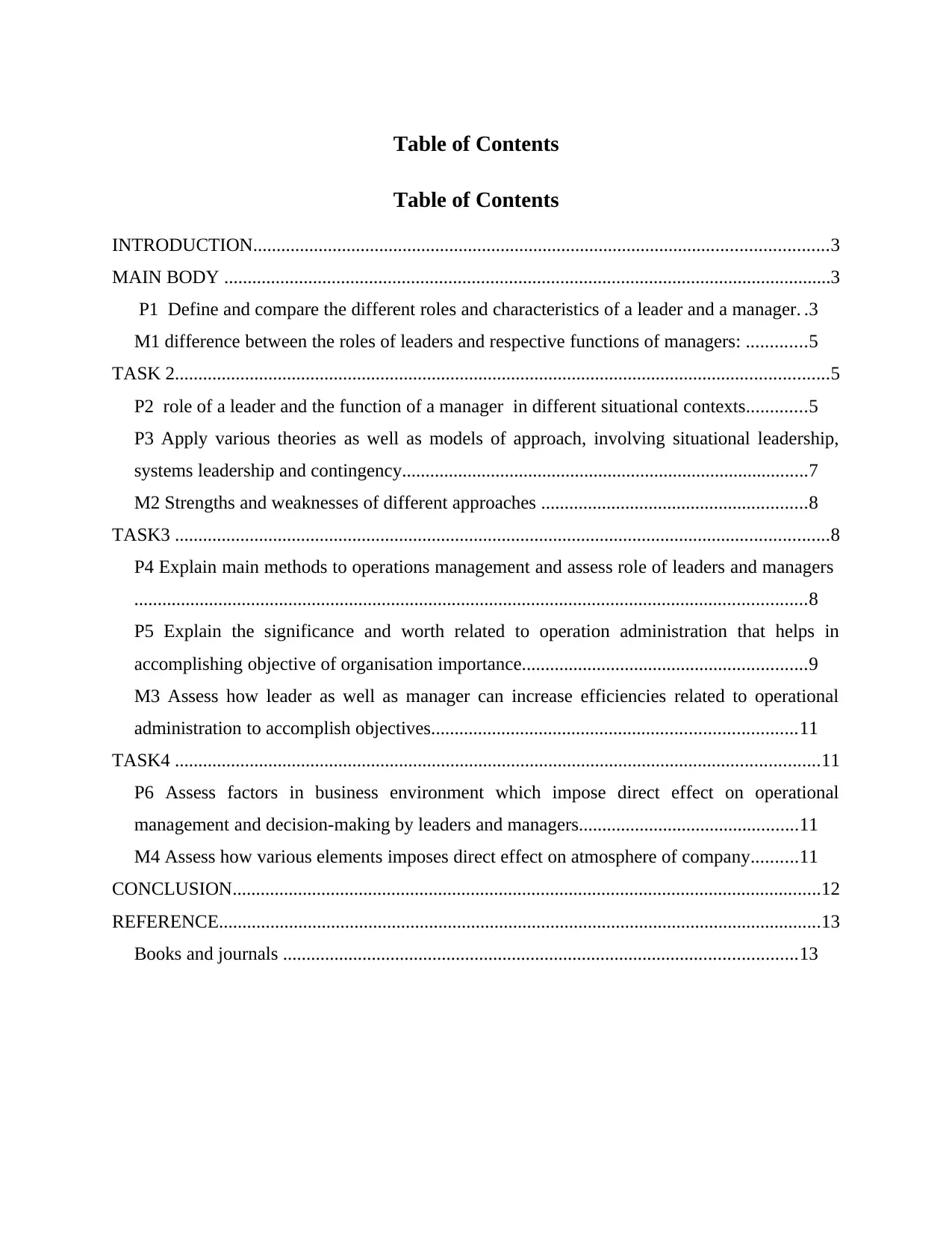
Table of Contents
Table of Contents
INTRODUCTION...........................................................................................................................3
MAIN BODY ..................................................................................................................................3
P1 Define and compare the different roles and characteristics of a leader and a manager. .3
M1 difference between the roles of leaders and respective functions of managers: .............5
TASK 2............................................................................................................................................5
P2 role of a leader and the function of a manager in different situational contexts.............5
P3 Apply various theories as well as models of approach, involving situational leadership,
systems leadership and contingency.......................................................................................7
M2 Strengths and weaknesses of different approaches .........................................................8
TASK3 ............................................................................................................................................8
P4 Explain main methods to operations management and assess role of leaders and managers
................................................................................................................................................8
P5 Explain the significance and worth related to operation administration that helps in
accomplishing objective of organisation importance.............................................................9
M3 Assess how leader as well as manager can increase efficiencies related to operational
administration to accomplish objectives..............................................................................11
TASK4 ..........................................................................................................................................11
P6 Assess factors in business environment which impose direct effect on operational
management and decision-making by leaders and managers...............................................11
M4 Assess how various elements imposes direct effect on atmosphere of company..........11
CONCLUSION..............................................................................................................................12
REFERENCE.................................................................................................................................13
Books and journals ..............................................................................................................13
Table of Contents
INTRODUCTION...........................................................................................................................3
MAIN BODY ..................................................................................................................................3
P1 Define and compare the different roles and characteristics of a leader and a manager. .3
M1 difference between the roles of leaders and respective functions of managers: .............5
TASK 2............................................................................................................................................5
P2 role of a leader and the function of a manager in different situational contexts.............5
P3 Apply various theories as well as models of approach, involving situational leadership,
systems leadership and contingency.......................................................................................7
M2 Strengths and weaknesses of different approaches .........................................................8
TASK3 ............................................................................................................................................8
P4 Explain main methods to operations management and assess role of leaders and managers
................................................................................................................................................8
P5 Explain the significance and worth related to operation administration that helps in
accomplishing objective of organisation importance.............................................................9
M3 Assess how leader as well as manager can increase efficiencies related to operational
administration to accomplish objectives..............................................................................11
TASK4 ..........................................................................................................................................11
P6 Assess factors in business environment which impose direct effect on operational
management and decision-making by leaders and managers...............................................11
M4 Assess how various elements imposes direct effect on atmosphere of company..........11
CONCLUSION..............................................................................................................................12
REFERENCE.................................................................................................................................13
Books and journals ..............................................................................................................13
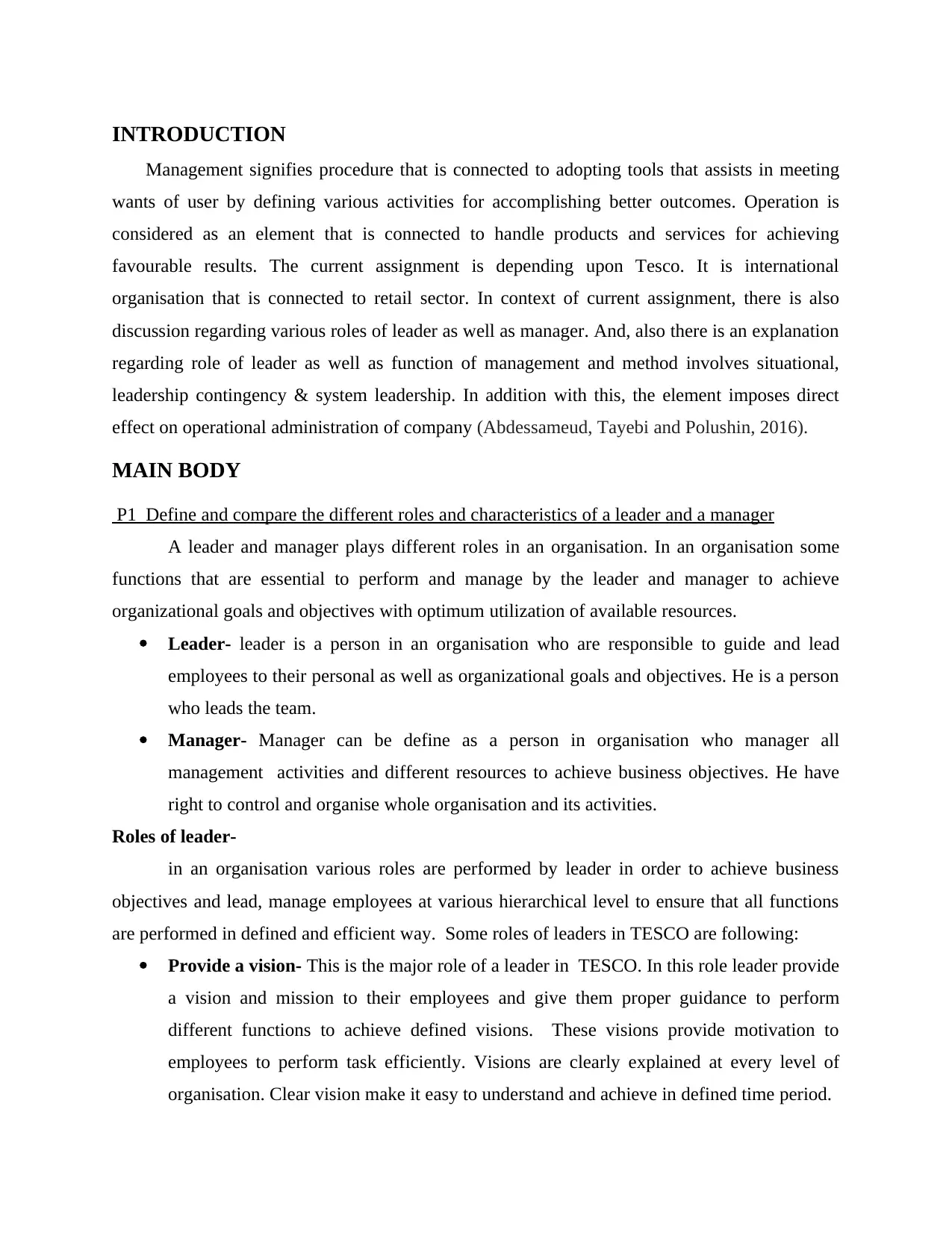
INTRODUCTION
Management signifies procedure that is connected to adopting tools that assists in meeting
wants of user by defining various activities for accomplishing better outcomes. Operation is
considered as an element that is connected to handle products and services for achieving
favourable results. The current assignment is depending upon Tesco. It is international
organisation that is connected to retail sector. In context of current assignment, there is also
discussion regarding various roles of leader as well as manager. And, also there is an explanation
regarding role of leader as well as function of management and method involves situational,
leadership contingency & system leadership. In addition with this, the element imposes direct
effect on operational administration of company (Abdessameud, Tayebi and Polushin, 2016).
MAIN BODY
P1 Define and compare the different roles and characteristics of a leader and a manager
A leader and manager plays different roles in an organisation. In an organisation some
functions that are essential to perform and manage by the leader and manager to achieve
organizational goals and objectives with optimum utilization of available resources.
Leader- leader is a person in an organisation who are responsible to guide and lead
employees to their personal as well as organizational goals and objectives. He is a person
who leads the team.
Manager- Manager can be define as a person in organisation who manager all
management activities and different resources to achieve business objectives. He have
right to control and organise whole organisation and its activities.
Roles of leader-
in an organisation various roles are performed by leader in order to achieve business
objectives and lead, manage employees at various hierarchical level to ensure that all functions
are performed in defined and efficient way. Some roles of leaders in TESCO are following:
Provide a vision- This is the major role of a leader in TESCO. In this role leader provide
a vision and mission to their employees and give them proper guidance to perform
different functions to achieve defined visions. These visions provide motivation to
employees to perform task efficiently. Visions are clearly explained at every level of
organisation. Clear vision make it easy to understand and achieve in defined time period.
Management signifies procedure that is connected to adopting tools that assists in meeting
wants of user by defining various activities for accomplishing better outcomes. Operation is
considered as an element that is connected to handle products and services for achieving
favourable results. The current assignment is depending upon Tesco. It is international
organisation that is connected to retail sector. In context of current assignment, there is also
discussion regarding various roles of leader as well as manager. And, also there is an explanation
regarding role of leader as well as function of management and method involves situational,
leadership contingency & system leadership. In addition with this, the element imposes direct
effect on operational administration of company (Abdessameud, Tayebi and Polushin, 2016).
MAIN BODY
P1 Define and compare the different roles and characteristics of a leader and a manager
A leader and manager plays different roles in an organisation. In an organisation some
functions that are essential to perform and manage by the leader and manager to achieve
organizational goals and objectives with optimum utilization of available resources.
Leader- leader is a person in an organisation who are responsible to guide and lead
employees to their personal as well as organizational goals and objectives. He is a person
who leads the team.
Manager- Manager can be define as a person in organisation who manager all
management activities and different resources to achieve business objectives. He have
right to control and organise whole organisation and its activities.
Roles of leader-
in an organisation various roles are performed by leader in order to achieve business
objectives and lead, manage employees at various hierarchical level to ensure that all functions
are performed in defined and efficient way. Some roles of leaders in TESCO are following:
Provide a vision- This is the major role of a leader in TESCO. In this role leader provide
a vision and mission to their employees and give them proper guidance to perform
different functions to achieve defined visions. These visions provide motivation to
employees to perform task efficiently. Visions are clearly explained at every level of
organisation. Clear vision make it easy to understand and achieve in defined time period.
⊘ This is a preview!⊘
Do you want full access?
Subscribe today to unlock all pages.

Trusted by 1+ million students worldwide
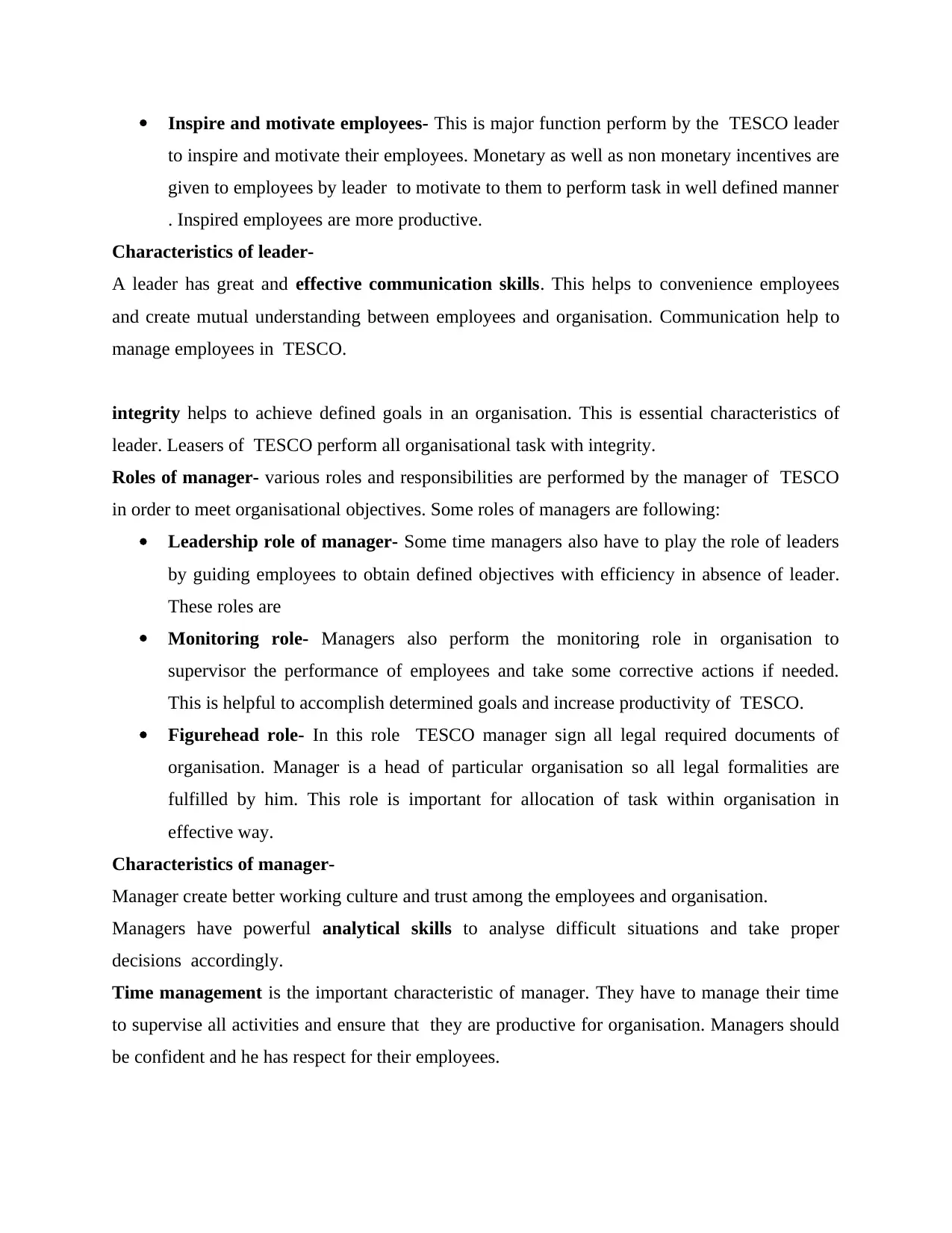
Inspire and motivate employees- This is major function perform by the TESCO leader
to inspire and motivate their employees. Monetary as well as non monetary incentives are
given to employees by leader to motivate to them to perform task in well defined manner
. Inspired employees are more productive.
Characteristics of leader-
A leader has great and effective communication skills. This helps to convenience employees
and create mutual understanding between employees and organisation. Communication help to
manage employees in TESCO.
integrity helps to achieve defined goals in an organisation. This is essential characteristics of
leader. Leasers of TESCO perform all organisational task with integrity.
Roles of manager- various roles and responsibilities are performed by the manager of TESCO
in order to meet organisational objectives. Some roles of managers are following:
Leadership role of manager- Some time managers also have to play the role of leaders
by guiding employees to obtain defined objectives with efficiency in absence of leader.
These roles are
Monitoring role- Managers also perform the monitoring role in organisation to
supervisor the performance of employees and take some corrective actions if needed.
This is helpful to accomplish determined goals and increase productivity of TESCO.
Figurehead role- In this role TESCO manager sign all legal required documents of
organisation. Manager is a head of particular organisation so all legal formalities are
fulfilled by him. This role is important for allocation of task within organisation in
effective way.
Characteristics of manager-
Manager create better working culture and trust among the employees and organisation.
Managers have powerful analytical skills to analyse difficult situations and take proper
decisions accordingly.
Time management is the important characteristic of manager. They have to manage their time
to supervise all activities and ensure that they are productive for organisation. Managers should
be confident and he has respect for their employees.
to inspire and motivate their employees. Monetary as well as non monetary incentives are
given to employees by leader to motivate to them to perform task in well defined manner
. Inspired employees are more productive.
Characteristics of leader-
A leader has great and effective communication skills. This helps to convenience employees
and create mutual understanding between employees and organisation. Communication help to
manage employees in TESCO.
integrity helps to achieve defined goals in an organisation. This is essential characteristics of
leader. Leasers of TESCO perform all organisational task with integrity.
Roles of manager- various roles and responsibilities are performed by the manager of TESCO
in order to meet organisational objectives. Some roles of managers are following:
Leadership role of manager- Some time managers also have to play the role of leaders
by guiding employees to obtain defined objectives with efficiency in absence of leader.
These roles are
Monitoring role- Managers also perform the monitoring role in organisation to
supervisor the performance of employees and take some corrective actions if needed.
This is helpful to accomplish determined goals and increase productivity of TESCO.
Figurehead role- In this role TESCO manager sign all legal required documents of
organisation. Manager is a head of particular organisation so all legal formalities are
fulfilled by him. This role is important for allocation of task within organisation in
effective way.
Characteristics of manager-
Manager create better working culture and trust among the employees and organisation.
Managers have powerful analytical skills to analyse difficult situations and take proper
decisions accordingly.
Time management is the important characteristic of manager. They have to manage their time
to supervise all activities and ensure that they are productive for organisation. Managers should
be confident and he has respect for their employees.
Paraphrase This Document
Need a fresh take? Get an instant paraphrase of this document with our AI Paraphraser
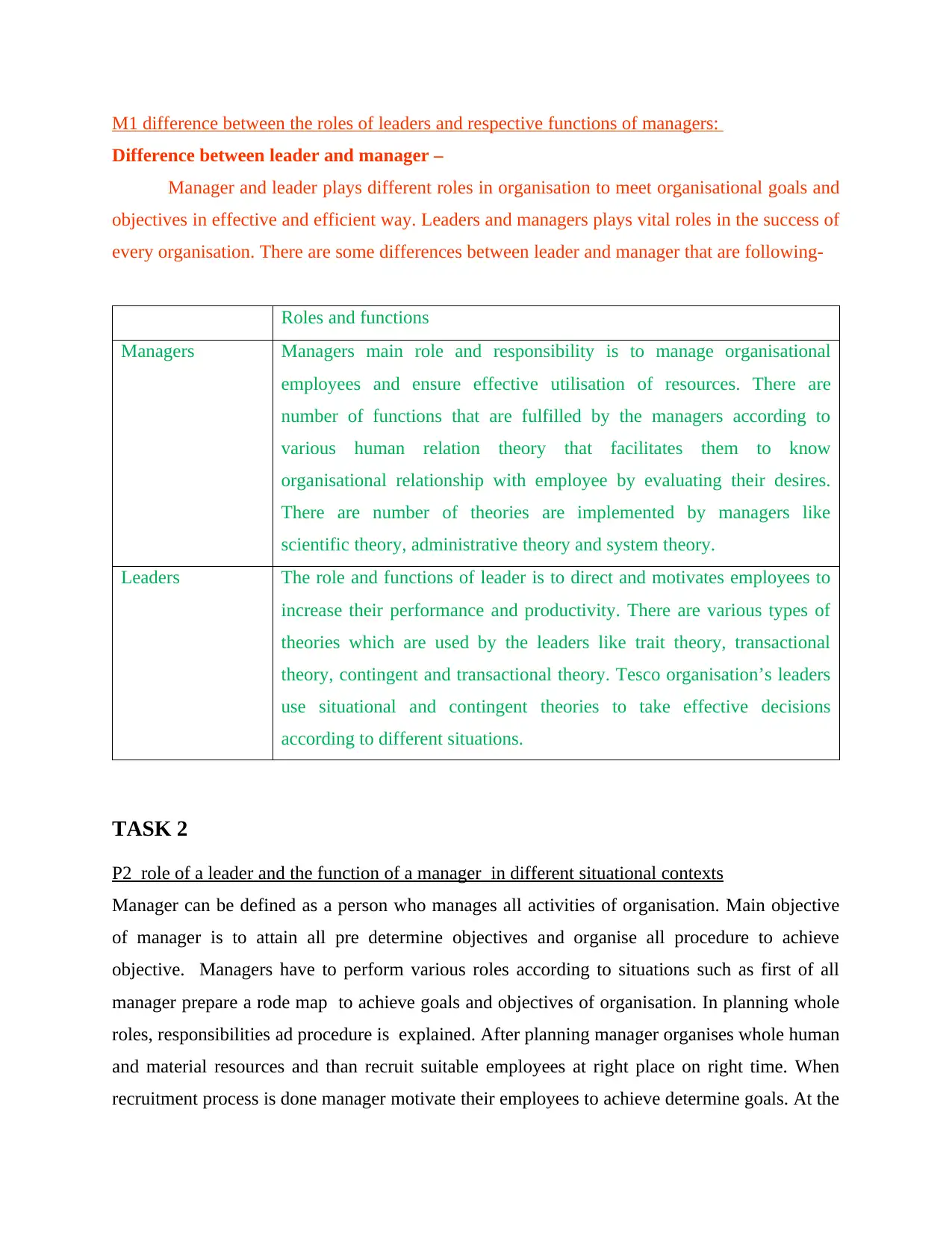
M1 difference between the roles of leaders and respective functions of managers:
Difference between leader and manager –
Manager and leader plays different roles in organisation to meet organisational goals and
objectives in effective and efficient way. Leaders and managers plays vital roles in the success of
every organisation. There are some differences between leader and manager that are following-
Roles and functions
Managers Managers main role and responsibility is to manage organisational
employees and ensure effective utilisation of resources. There are
number of functions that are fulfilled by the managers according to
various human relation theory that facilitates them to know
organisational relationship with employee by evaluating their desires.
There are number of theories are implemented by managers like
scientific theory, administrative theory and system theory.
Leaders The role and functions of leader is to direct and motivates employees to
increase their performance and productivity. There are various types of
theories which are used by the leaders like trait theory, transactional
theory, contingent and transactional theory. Tesco organisation’s leaders
use situational and contingent theories to take effective decisions
according to different situations.
TASK 2
P2 role of a leader and the function of a manager in different situational contexts
Manager can be defined as a person who manages all activities of organisation. Main objective
of manager is to attain all pre determine objectives and organise all procedure to achieve
objective. Managers have to perform various roles according to situations such as first of all
manager prepare a rode map to achieve goals and objectives of organisation. In planning whole
roles, responsibilities ad procedure is explained. After planning manager organises whole human
and material resources and than recruit suitable employees at right place on right time. When
recruitment process is done manager motivate their employees to achieve determine goals. At the
Difference between leader and manager –
Manager and leader plays different roles in organisation to meet organisational goals and
objectives in effective and efficient way. Leaders and managers plays vital roles in the success of
every organisation. There are some differences between leader and manager that are following-
Roles and functions
Managers Managers main role and responsibility is to manage organisational
employees and ensure effective utilisation of resources. There are
number of functions that are fulfilled by the managers according to
various human relation theory that facilitates them to know
organisational relationship with employee by evaluating their desires.
There are number of theories are implemented by managers like
scientific theory, administrative theory and system theory.
Leaders The role and functions of leader is to direct and motivates employees to
increase their performance and productivity. There are various types of
theories which are used by the leaders like trait theory, transactional
theory, contingent and transactional theory. Tesco organisation’s leaders
use situational and contingent theories to take effective decisions
according to different situations.
TASK 2
P2 role of a leader and the function of a manager in different situational contexts
Manager can be defined as a person who manages all activities of organisation. Main objective
of manager is to attain all pre determine objectives and organise all procedure to achieve
objective. Managers have to perform various roles according to situations such as first of all
manager prepare a rode map to achieve goals and objectives of organisation. In planning whole
roles, responsibilities ad procedure is explained. After planning manager organises whole human
and material resources and than recruit suitable employees at right place on right time. When
recruitment process is done manager motivate their employees to achieve determine goals. At the
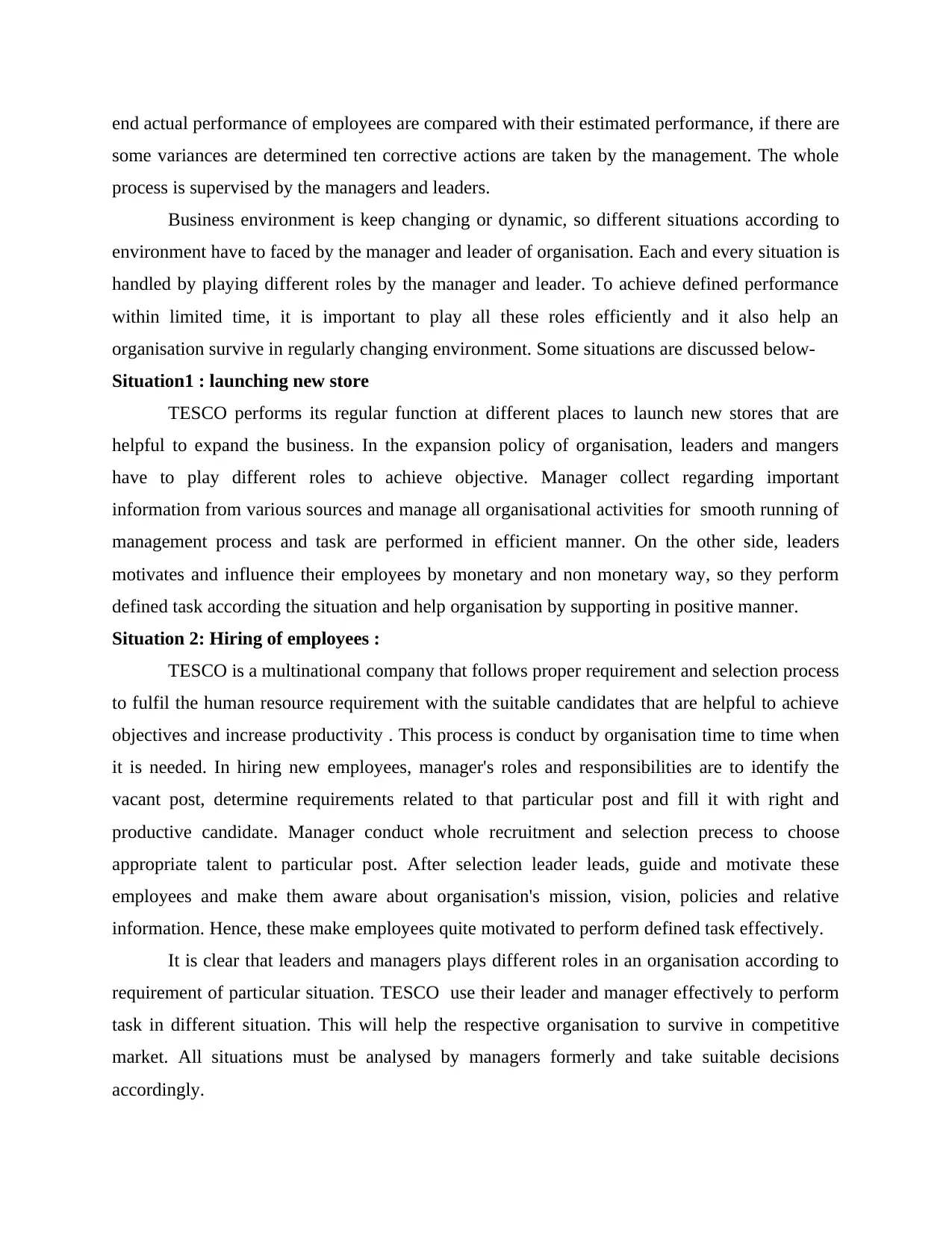
end actual performance of employees are compared with their estimated performance, if there are
some variances are determined ten corrective actions are taken by the management. The whole
process is supervised by the managers and leaders.
Business environment is keep changing or dynamic, so different situations according to
environment have to faced by the manager and leader of organisation. Each and every situation is
handled by playing different roles by the manager and leader. To achieve defined performance
within limited time, it is important to play all these roles efficiently and it also help an
organisation survive in regularly changing environment. Some situations are discussed below-
Situation1 : launching new store
TESCO performs its regular function at different places to launch new stores that are
helpful to expand the business. In the expansion policy of organisation, leaders and mangers
have to play different roles to achieve objective. Manager collect regarding important
information from various sources and manage all organisational activities for smooth running of
management process and task are performed in efficient manner. On the other side, leaders
motivates and influence their employees by monetary and non monetary way, so they perform
defined task according the situation and help organisation by supporting in positive manner.
Situation 2: Hiring of employees :
TESCO is a multinational company that follows proper requirement and selection process
to fulfil the human resource requirement with the suitable candidates that are helpful to achieve
objectives and increase productivity . This process is conduct by organisation time to time when
it is needed. In hiring new employees, manager's roles and responsibilities are to identify the
vacant post, determine requirements related to that particular post and fill it with right and
productive candidate. Manager conduct whole recruitment and selection precess to choose
appropriate talent to particular post. After selection leader leads, guide and motivate these
employees and make them aware about organisation's mission, vision, policies and relative
information. Hence, these make employees quite motivated to perform defined task effectively.
It is clear that leaders and managers plays different roles in an organisation according to
requirement of particular situation. TESCO use their leader and manager effectively to perform
task in different situation. This will help the respective organisation to survive in competitive
market. All situations must be analysed by managers formerly and take suitable decisions
accordingly.
some variances are determined ten corrective actions are taken by the management. The whole
process is supervised by the managers and leaders.
Business environment is keep changing or dynamic, so different situations according to
environment have to faced by the manager and leader of organisation. Each and every situation is
handled by playing different roles by the manager and leader. To achieve defined performance
within limited time, it is important to play all these roles efficiently and it also help an
organisation survive in regularly changing environment. Some situations are discussed below-
Situation1 : launching new store
TESCO performs its regular function at different places to launch new stores that are
helpful to expand the business. In the expansion policy of organisation, leaders and mangers
have to play different roles to achieve objective. Manager collect regarding important
information from various sources and manage all organisational activities for smooth running of
management process and task are performed in efficient manner. On the other side, leaders
motivates and influence their employees by monetary and non monetary way, so they perform
defined task according the situation and help organisation by supporting in positive manner.
Situation 2: Hiring of employees :
TESCO is a multinational company that follows proper requirement and selection process
to fulfil the human resource requirement with the suitable candidates that are helpful to achieve
objectives and increase productivity . This process is conduct by organisation time to time when
it is needed. In hiring new employees, manager's roles and responsibilities are to identify the
vacant post, determine requirements related to that particular post and fill it with right and
productive candidate. Manager conduct whole recruitment and selection precess to choose
appropriate talent to particular post. After selection leader leads, guide and motivate these
employees and make them aware about organisation's mission, vision, policies and relative
information. Hence, these make employees quite motivated to perform defined task effectively.
It is clear that leaders and managers plays different roles in an organisation according to
requirement of particular situation. TESCO use their leader and manager effectively to perform
task in different situation. This will help the respective organisation to survive in competitive
market. All situations must be analysed by managers formerly and take suitable decisions
accordingly.
⊘ This is a preview!⊘
Do you want full access?
Subscribe today to unlock all pages.

Trusted by 1+ million students worldwide
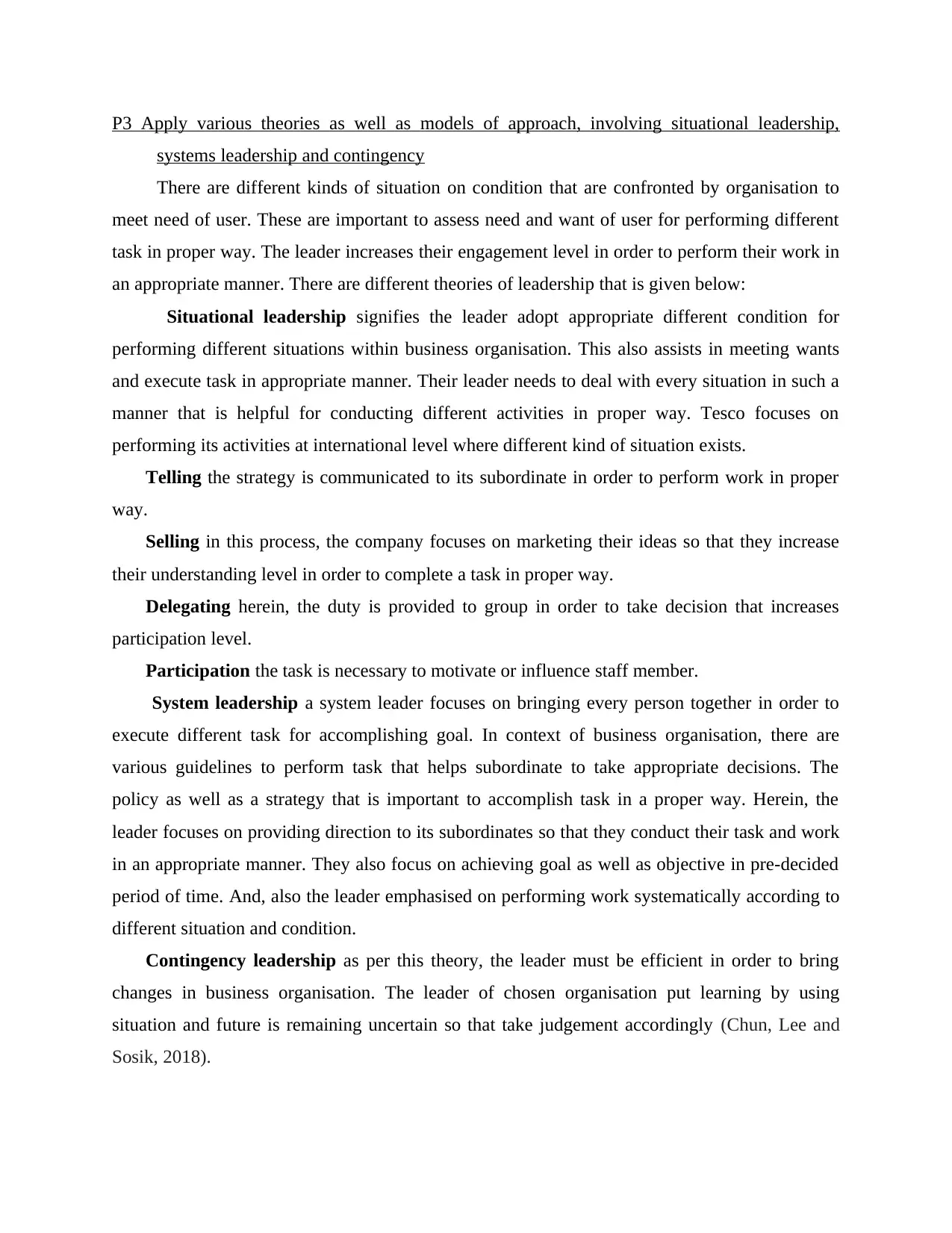
P3 Apply various theories as well as models of approach, involving situational leadership,
systems leadership and contingency
There are different kinds of situation on condition that are confronted by organisation to
meet need of user. These are important to assess need and want of user for performing different
task in proper way. The leader increases their engagement level in order to perform their work in
an appropriate manner. There are different theories of leadership that is given below:
Situational leadership signifies the leader adopt appropriate different condition for
performing different situations within business organisation. This also assists in meeting wants
and execute task in appropriate manner. Their leader needs to deal with every situation in such a
manner that is helpful for conducting different activities in proper way. Tesco focuses on
performing its activities at international level where different kind of situation exists.
Telling the strategy is communicated to its subordinate in order to perform work in proper
way.
Selling in this process, the company focuses on marketing their ideas so that they increase
their understanding level in order to complete a task in proper way.
Delegating herein, the duty is provided to group in order to take decision that increases
participation level.
Participation the task is necessary to motivate or influence staff member.
System leadership a system leader focuses on bringing every person together in order to
execute different task for accomplishing goal. In context of business organisation, there are
various guidelines to perform task that helps subordinate to take appropriate decisions. The
policy as well as a strategy that is important to accomplish task in a proper way. Herein, the
leader focuses on providing direction to its subordinates so that they conduct their task and work
in an appropriate manner. They also focus on achieving goal as well as objective in pre-decided
period of time. And, also the leader emphasised on performing work systematically according to
different situation and condition.
Contingency leadership as per this theory, the leader must be efficient in order to bring
changes in business organisation. The leader of chosen organisation put learning by using
situation and future is remaining uncertain so that take judgement accordingly (Chun, Lee and
Sosik, 2018).
systems leadership and contingency
There are different kinds of situation on condition that are confronted by organisation to
meet need of user. These are important to assess need and want of user for performing different
task in proper way. The leader increases their engagement level in order to perform their work in
an appropriate manner. There are different theories of leadership that is given below:
Situational leadership signifies the leader adopt appropriate different condition for
performing different situations within business organisation. This also assists in meeting wants
and execute task in appropriate manner. Their leader needs to deal with every situation in such a
manner that is helpful for conducting different activities in proper way. Tesco focuses on
performing its activities at international level where different kind of situation exists.
Telling the strategy is communicated to its subordinate in order to perform work in proper
way.
Selling in this process, the company focuses on marketing their ideas so that they increase
their understanding level in order to complete a task in proper way.
Delegating herein, the duty is provided to group in order to take decision that increases
participation level.
Participation the task is necessary to motivate or influence staff member.
System leadership a system leader focuses on bringing every person together in order to
execute different task for accomplishing goal. In context of business organisation, there are
various guidelines to perform task that helps subordinate to take appropriate decisions. The
policy as well as a strategy that is important to accomplish task in a proper way. Herein, the
leader focuses on providing direction to its subordinates so that they conduct their task and work
in an appropriate manner. They also focus on achieving goal as well as objective in pre-decided
period of time. And, also the leader emphasised on performing work systematically according to
different situation and condition.
Contingency leadership as per this theory, the leader must be efficient in order to bring
changes in business organisation. The leader of chosen organisation put learning by using
situation and future is remaining uncertain so that take judgement accordingly (Chun, Lee and
Sosik, 2018).
Paraphrase This Document
Need a fresh take? Get an instant paraphrase of this document with our AI Paraphraser
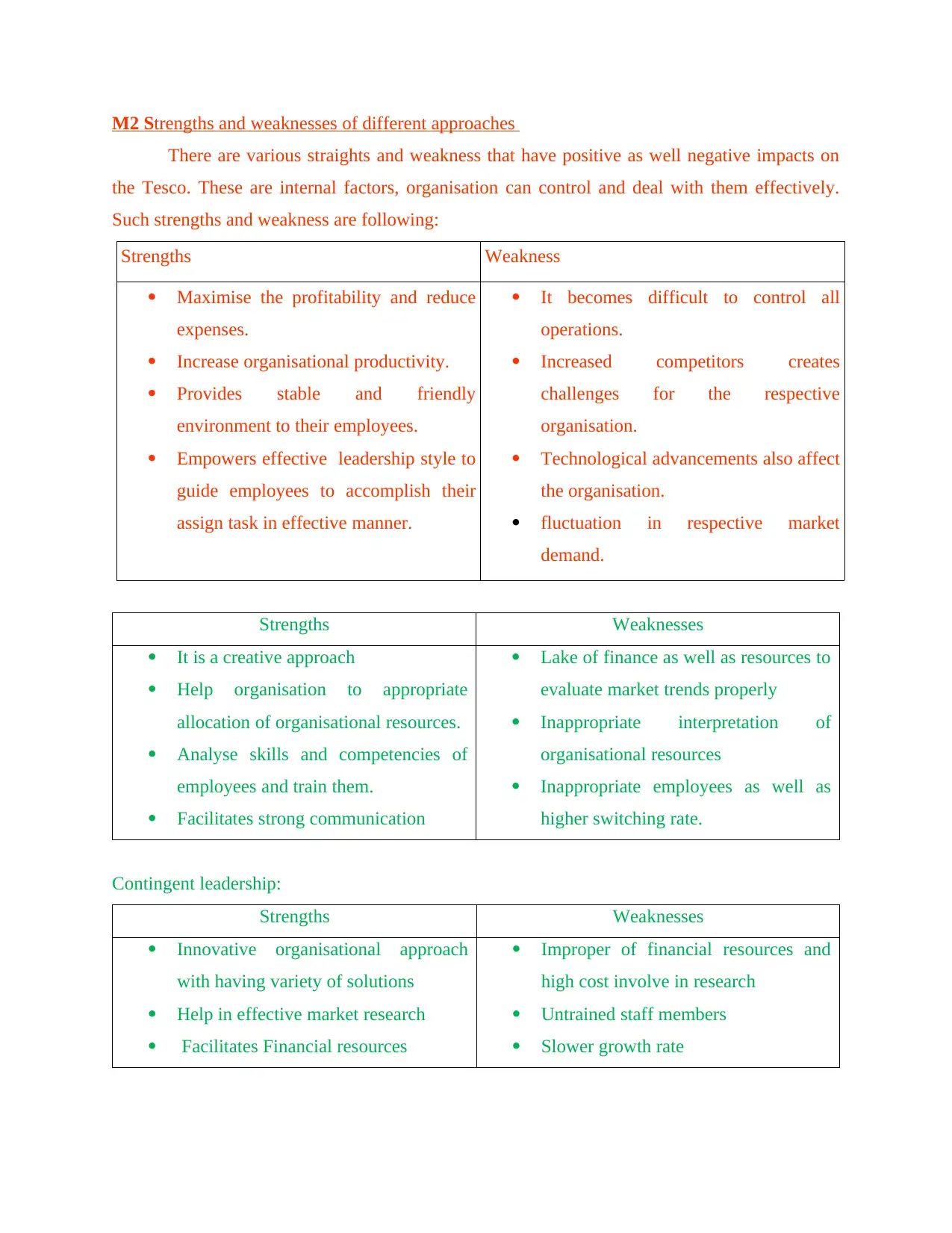
M2 Strengths and weaknesses of different approaches
There are various straights and weakness that have positive as well negative impacts on
the Tesco. These are internal factors, organisation can control and deal with them effectively.
Such strengths and weakness are following:
Strengths Weakness
Maximise the profitability and reduce
expenses.
Increase organisational productivity.
Provides stable and friendly
environment to their employees.
Empowers effective leadership style to
guide employees to accomplish their
assign task in effective manner.
It becomes difficult to control all
operations.
Increased competitors creates
challenges for the respective
organisation.
Technological advancements also affect
the organisation.
fluctuation in respective market
demand.
Strengths Weaknesses
It is a creative approach
Help organisation to appropriate
allocation of organisational resources.
Analyse skills and competencies of
employees and train them.
Facilitates strong communication
Lake of finance as well as resources to
evaluate market trends properly
Inappropriate interpretation of
organisational resources
Inappropriate employees as well as
higher switching rate.
Contingent leadership:
Strengths Weaknesses
Innovative organisational approach
with having variety of solutions
Help in effective market research
Facilitates Financial resources
Improper of financial resources and
high cost involve in research
Untrained staff members
Slower growth rate
There are various straights and weakness that have positive as well negative impacts on
the Tesco. These are internal factors, organisation can control and deal with them effectively.
Such strengths and weakness are following:
Strengths Weakness
Maximise the profitability and reduce
expenses.
Increase organisational productivity.
Provides stable and friendly
environment to their employees.
Empowers effective leadership style to
guide employees to accomplish their
assign task in effective manner.
It becomes difficult to control all
operations.
Increased competitors creates
challenges for the respective
organisation.
Technological advancements also affect
the organisation.
fluctuation in respective market
demand.
Strengths Weaknesses
It is a creative approach
Help organisation to appropriate
allocation of organisational resources.
Analyse skills and competencies of
employees and train them.
Facilitates strong communication
Lake of finance as well as resources to
evaluate market trends properly
Inappropriate interpretation of
organisational resources
Inappropriate employees as well as
higher switching rate.
Contingent leadership:
Strengths Weaknesses
Innovative organisational approach
with having variety of solutions
Help in effective market research
Facilitates Financial resources
Improper of financial resources and
high cost involve in research
Untrained staff members
Slower growth rate
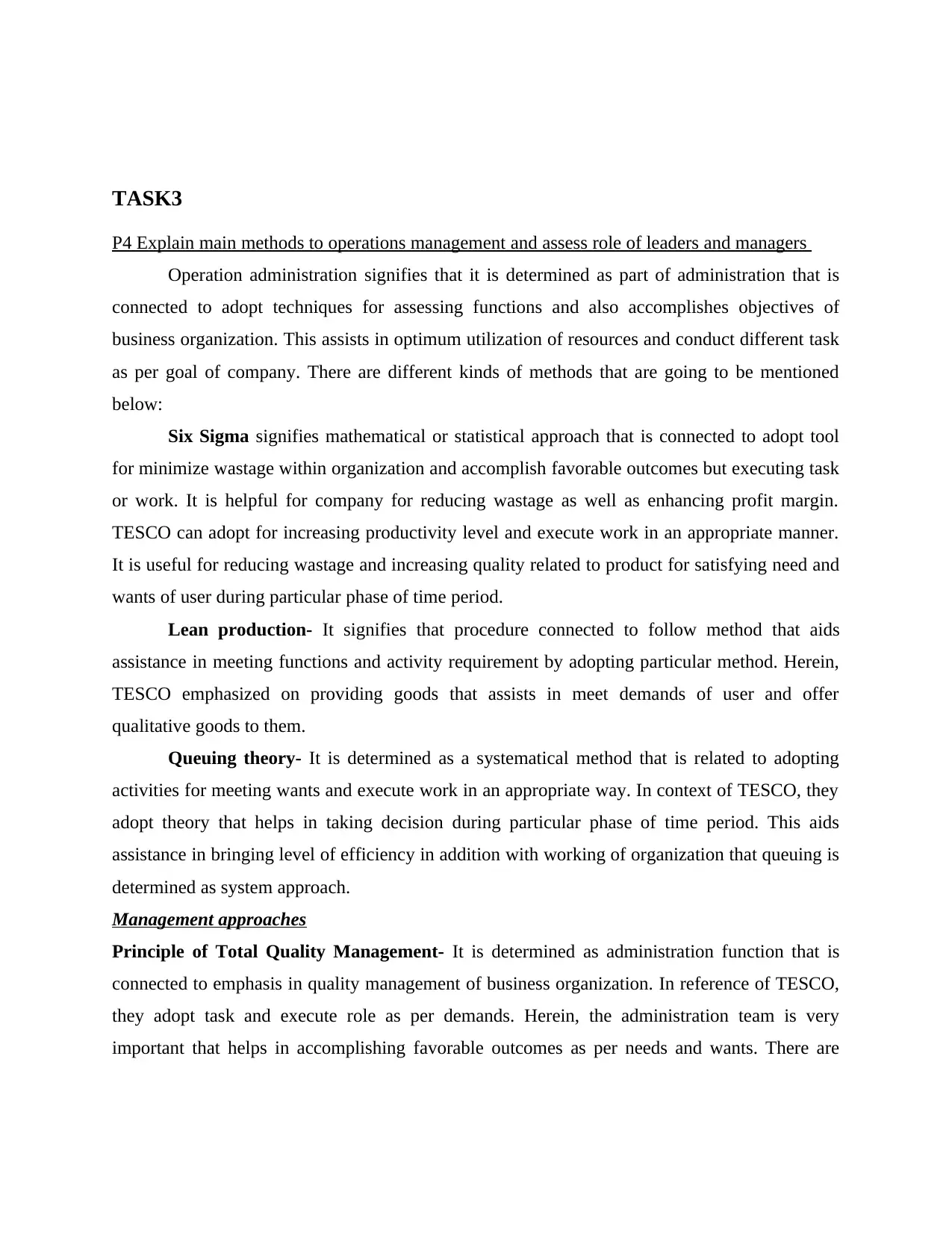
TASK3
P4 Explain main methods to operations management and assess role of leaders and managers
Operation administration signifies that it is determined as part of administration that is
connected to adopt techniques for assessing functions and also accomplishes objectives of
business organization. This assists in optimum utilization of resources and conduct different task
as per goal of company. There are different kinds of methods that are going to be mentioned
below:
Six Sigma signifies mathematical or statistical approach that is connected to adopt tool
for minimize wastage within organization and accomplish favorable outcomes but executing task
or work. It is helpful for company for reducing wastage as well as enhancing profit margin.
TESCO can adopt for increasing productivity level and execute work in an appropriate manner.
It is useful for reducing wastage and increasing quality related to product for satisfying need and
wants of user during particular phase of time period.
Lean production- It signifies that procedure connected to follow method that aids
assistance in meeting functions and activity requirement by adopting particular method. Herein,
TESCO emphasized on providing goods that assists in meet demands of user and offer
qualitative goods to them.
Queuing theory- It is determined as a systematical method that is related to adopting
activities for meeting wants and execute work in an appropriate way. In context of TESCO, they
adopt theory that helps in taking decision during particular phase of time period. This aids
assistance in bringing level of efficiency in addition with working of organization that queuing is
determined as system approach.
Management approaches
Principle of Total Quality Management- It is determined as administration function that is
connected to emphasis in quality management of business organization. In reference of TESCO,
they adopt task and execute role as per demands. Herein, the administration team is very
important that helps in accomplishing favorable outcomes as per needs and wants. There are
P4 Explain main methods to operations management and assess role of leaders and managers
Operation administration signifies that it is determined as part of administration that is
connected to adopt techniques for assessing functions and also accomplishes objectives of
business organization. This assists in optimum utilization of resources and conduct different task
as per goal of company. There are different kinds of methods that are going to be mentioned
below:
Six Sigma signifies mathematical or statistical approach that is connected to adopt tool
for minimize wastage within organization and accomplish favorable outcomes but executing task
or work. It is helpful for company for reducing wastage as well as enhancing profit margin.
TESCO can adopt for increasing productivity level and execute work in an appropriate manner.
It is useful for reducing wastage and increasing quality related to product for satisfying need and
wants of user during particular phase of time period.
Lean production- It signifies that procedure connected to follow method that aids
assistance in meeting functions and activity requirement by adopting particular method. Herein,
TESCO emphasized on providing goods that assists in meet demands of user and offer
qualitative goods to them.
Queuing theory- It is determined as a systematical method that is related to adopting
activities for meeting wants and execute work in an appropriate way. In context of TESCO, they
adopt theory that helps in taking decision during particular phase of time period. This aids
assistance in bringing level of efficiency in addition with working of organization that queuing is
determined as system approach.
Management approaches
Principle of Total Quality Management- It is determined as administration function that is
connected to emphasis in quality management of business organization. In reference of TESCO,
they adopt task and execute role as per demands. Herein, the administration team is very
important that helps in accomplishing favorable outcomes as per needs and wants. There are
⊘ This is a preview!⊘
Do you want full access?
Subscribe today to unlock all pages.

Trusted by 1+ million students worldwide
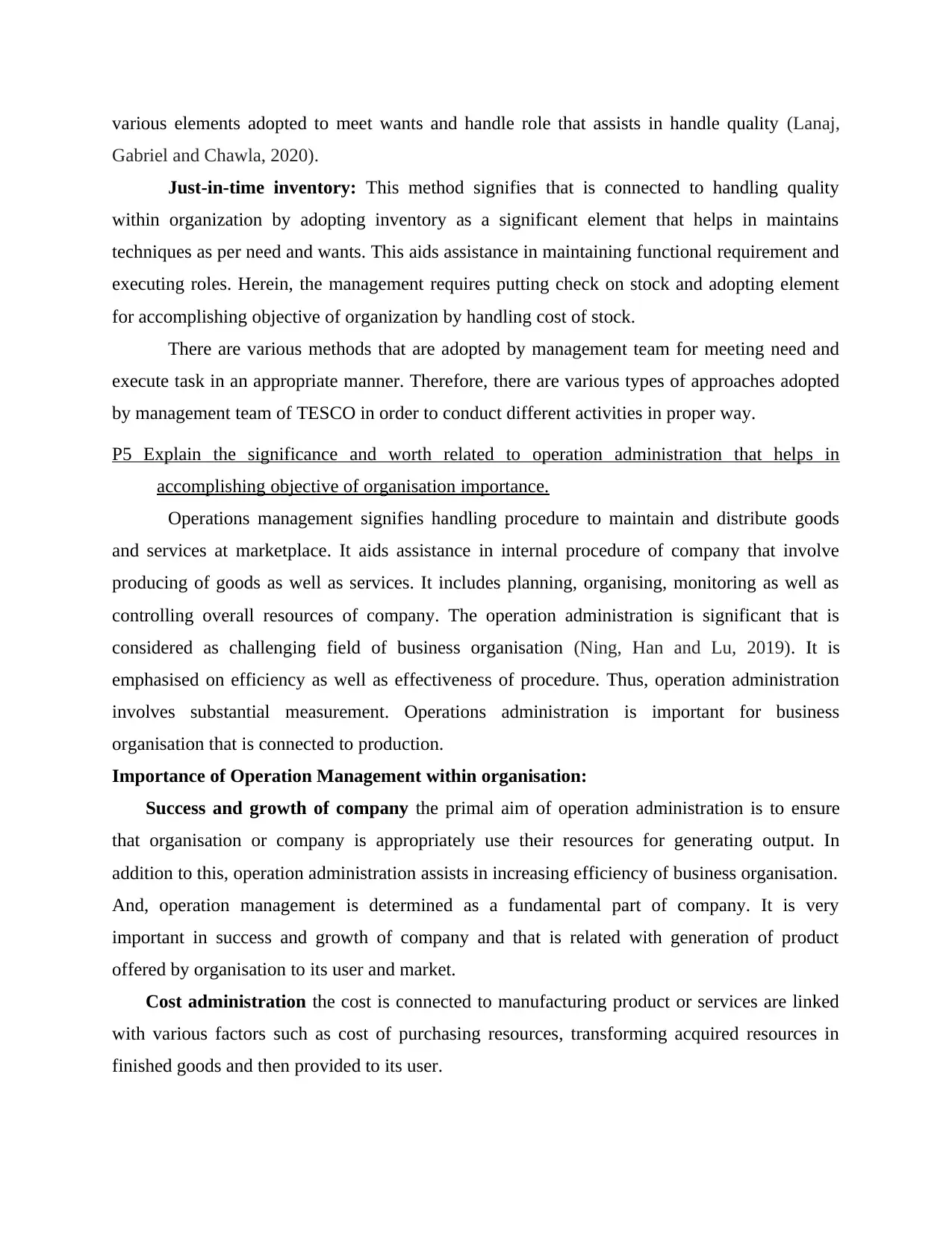
various elements adopted to meet wants and handle role that assists in handle quality (Lanaj,
Gabriel and Chawla, 2020).
Just-in-time inventory: This method signifies that is connected to handling quality
within organization by adopting inventory as a significant element that helps in maintains
techniques as per need and wants. This aids assistance in maintaining functional requirement and
executing roles. Herein, the management requires putting check on stock and adopting element
for accomplishing objective of organization by handling cost of stock.
There are various methods that are adopted by management team for meeting need and
execute task in an appropriate manner. Therefore, there are various types of approaches adopted
by management team of TESCO in order to conduct different activities in proper way.
P5 Explain the significance and worth related to operation administration that helps in
accomplishing objective of organisation importance.
Operations management signifies handling procedure to maintain and distribute goods
and services at marketplace. It aids assistance in internal procedure of company that involve
producing of goods as well as services. It includes planning, organising, monitoring as well as
controlling overall resources of company. The operation administration is significant that is
considered as challenging field of business organisation (Ning, Han and Lu, 2019). It is
emphasised on efficiency as well as effectiveness of procedure. Thus, operation administration
involves substantial measurement. Operations administration is important for business
organisation that is connected to production.
Importance of Operation Management within organisation:
Success and growth of company the primal aim of operation administration is to ensure
that organisation or company is appropriately use their resources for generating output. In
addition to this, operation administration assists in increasing efficiency of business organisation.
And, operation management is determined as a fundamental part of company. It is very
important in success and growth of company and that is related with generation of product
offered by organisation to its user and market.
Cost administration the cost is connected to manufacturing product or services are linked
with various factors such as cost of purchasing resources, transforming acquired resources in
finished goods and then provided to its user.
Gabriel and Chawla, 2020).
Just-in-time inventory: This method signifies that is connected to handling quality
within organization by adopting inventory as a significant element that helps in maintains
techniques as per need and wants. This aids assistance in maintaining functional requirement and
executing roles. Herein, the management requires putting check on stock and adopting element
for accomplishing objective of organization by handling cost of stock.
There are various methods that are adopted by management team for meeting need and
execute task in an appropriate manner. Therefore, there are various types of approaches adopted
by management team of TESCO in order to conduct different activities in proper way.
P5 Explain the significance and worth related to operation administration that helps in
accomplishing objective of organisation importance.
Operations management signifies handling procedure to maintain and distribute goods
and services at marketplace. It aids assistance in internal procedure of company that involve
producing of goods as well as services. It includes planning, organising, monitoring as well as
controlling overall resources of company. The operation administration is significant that is
considered as challenging field of business organisation (Ning, Han and Lu, 2019). It is
emphasised on efficiency as well as effectiveness of procedure. Thus, operation administration
involves substantial measurement. Operations administration is important for business
organisation that is connected to production.
Importance of Operation Management within organisation:
Success and growth of company the primal aim of operation administration is to ensure
that organisation or company is appropriately use their resources for generating output. In
addition to this, operation administration assists in increasing efficiency of business organisation.
And, operation management is determined as a fundamental part of company. It is very
important in success and growth of company and that is related with generation of product
offered by organisation to its user and market.
Cost administration the cost is connected to manufacturing product or services are linked
with various factors such as cost of purchasing resources, transforming acquired resources in
finished goods and then provided to its user.
Paraphrase This Document
Need a fresh take? Get an instant paraphrase of this document with our AI Paraphraser
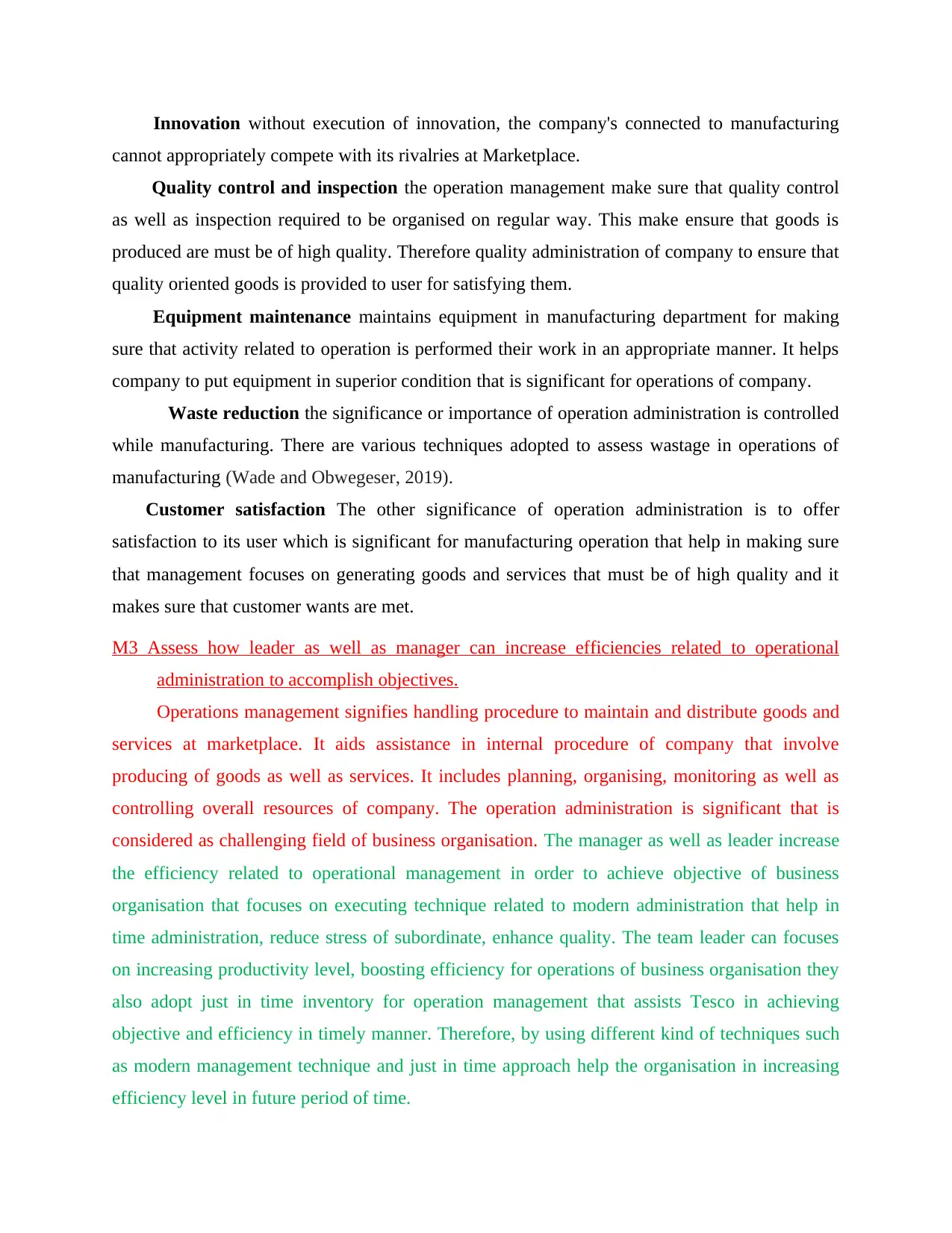
Innovation without execution of innovation, the company's connected to manufacturing
cannot appropriately compete with its rivalries at Marketplace.
Quality control and inspection the operation management make sure that quality control
as well as inspection required to be organised on regular way. This make ensure that goods is
produced are must be of high quality. Therefore quality administration of company to ensure that
quality oriented goods is provided to user for satisfying them.
Equipment maintenance maintains equipment in manufacturing department for making
sure that activity related to operation is performed their work in an appropriate manner. It helps
company to put equipment in superior condition that is significant for operations of company.
Waste reduction the significance or importance of operation administration is controlled
while manufacturing. There are various techniques adopted to assess wastage in operations of
manufacturing (Wade and Obwegeser, 2019).
Customer satisfaction The other significance of operation administration is to offer
satisfaction to its user which is significant for manufacturing operation that help in making sure
that management focuses on generating goods and services that must be of high quality and it
makes sure that customer wants are met.
M3 Assess how leader as well as manager can increase efficiencies related to operational
administration to accomplish objectives.
Operations management signifies handling procedure to maintain and distribute goods and
services at marketplace. It aids assistance in internal procedure of company that involve
producing of goods as well as services. It includes planning, organising, monitoring as well as
controlling overall resources of company. The operation administration is significant that is
considered as challenging field of business organisation. The manager as well as leader increase
the efficiency related to operational management in order to achieve objective of business
organisation that focuses on executing technique related to modern administration that help in
time administration, reduce stress of subordinate, enhance quality. The team leader can focuses
on increasing productivity level, boosting efficiency for operations of business organisation they
also adopt just in time inventory for operation management that assists Tesco in achieving
objective and efficiency in timely manner. Therefore, by using different kind of techniques such
as modern management technique and just in time approach help the organisation in increasing
efficiency level in future period of time.
cannot appropriately compete with its rivalries at Marketplace.
Quality control and inspection the operation management make sure that quality control
as well as inspection required to be organised on regular way. This make ensure that goods is
produced are must be of high quality. Therefore quality administration of company to ensure that
quality oriented goods is provided to user for satisfying them.
Equipment maintenance maintains equipment in manufacturing department for making
sure that activity related to operation is performed their work in an appropriate manner. It helps
company to put equipment in superior condition that is significant for operations of company.
Waste reduction the significance or importance of operation administration is controlled
while manufacturing. There are various techniques adopted to assess wastage in operations of
manufacturing (Wade and Obwegeser, 2019).
Customer satisfaction The other significance of operation administration is to offer
satisfaction to its user which is significant for manufacturing operation that help in making sure
that management focuses on generating goods and services that must be of high quality and it
makes sure that customer wants are met.
M3 Assess how leader as well as manager can increase efficiencies related to operational
administration to accomplish objectives.
Operations management signifies handling procedure to maintain and distribute goods and
services at marketplace. It aids assistance in internal procedure of company that involve
producing of goods as well as services. It includes planning, organising, monitoring as well as
controlling overall resources of company. The operation administration is significant that is
considered as challenging field of business organisation. The manager as well as leader increase
the efficiency related to operational management in order to achieve objective of business
organisation that focuses on executing technique related to modern administration that help in
time administration, reduce stress of subordinate, enhance quality. The team leader can focuses
on increasing productivity level, boosting efficiency for operations of business organisation they
also adopt just in time inventory for operation management that assists Tesco in achieving
objective and efficiency in timely manner. Therefore, by using different kind of techniques such
as modern management technique and just in time approach help the organisation in increasing
efficiency level in future period of time.
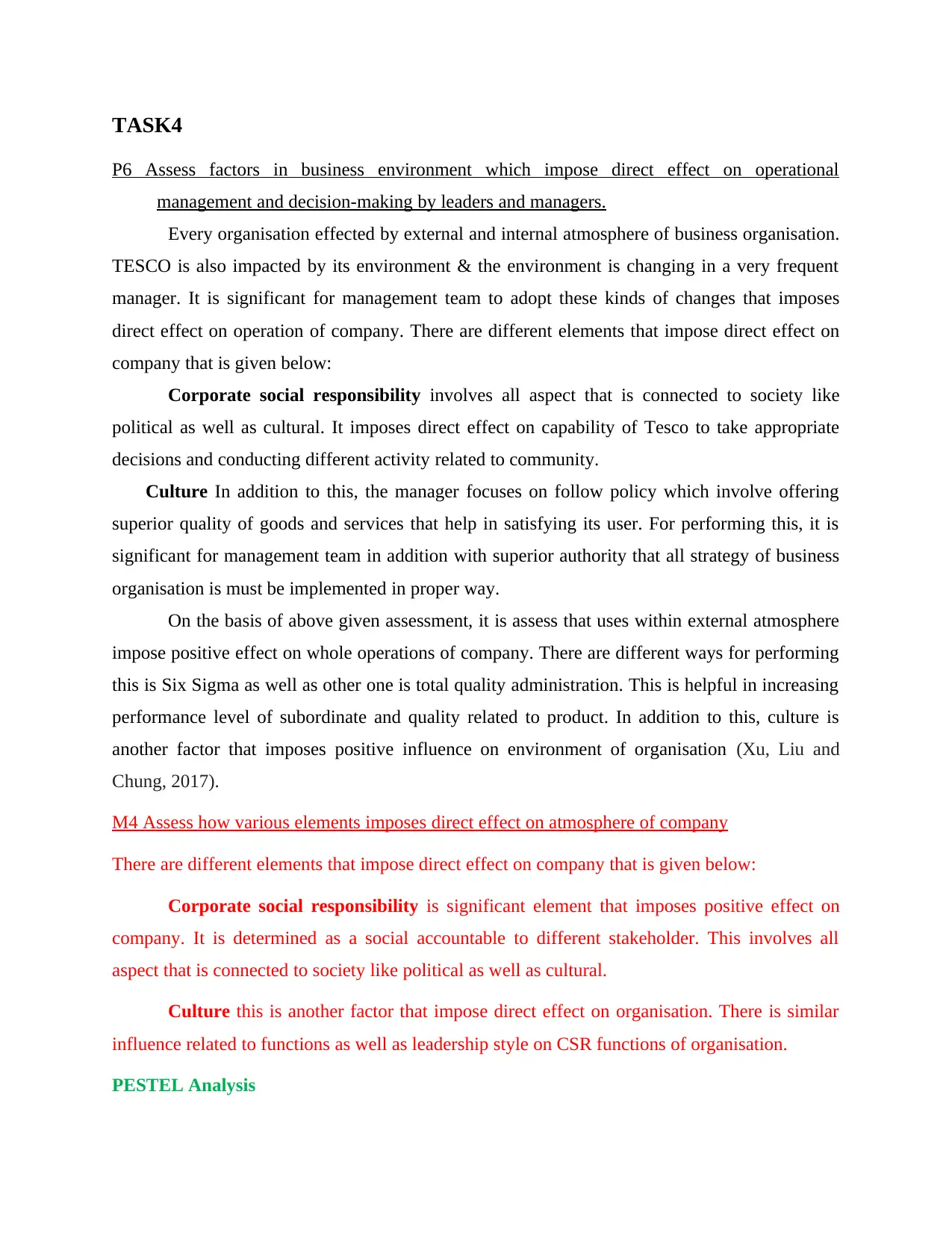
TASK4
P6 Assess factors in business environment which impose direct effect on operational
management and decision-making by leaders and managers.
Every organisation effected by external and internal atmosphere of business organisation.
TESCO is also impacted by its environment & the environment is changing in a very frequent
manager. It is significant for management team to adopt these kinds of changes that imposes
direct effect on operation of company. There are different elements that impose direct effect on
company that is given below:
Corporate social responsibility involves all aspect that is connected to society like
political as well as cultural. It imposes direct effect on capability of Tesco to take appropriate
decisions and conducting different activity related to community.
Culture In addition to this, the manager focuses on follow policy which involve offering
superior quality of goods and services that help in satisfying its user. For performing this, it is
significant for management team in addition with superior authority that all strategy of business
organisation is must be implemented in proper way.
On the basis of above given assessment, it is assess that uses within external atmosphere
impose positive effect on whole operations of company. There are different ways for performing
this is Six Sigma as well as other one is total quality administration. This is helpful in increasing
performance level of subordinate and quality related to product. In addition to this, culture is
another factor that imposes positive influence on environment of organisation (Xu, Liu and
Chung, 2017).
M4 Assess how various elements imposes direct effect on atmosphere of company
There are different elements that impose direct effect on company that is given below:
Corporate social responsibility is significant element that imposes positive effect on
company. It is determined as a social accountable to different stakeholder. This involves all
aspect that is connected to society like political as well as cultural.
Culture this is another factor that impose direct effect on organisation. There is similar
influence related to functions as well as leadership style on CSR functions of organisation.
PESTEL Analysis
P6 Assess factors in business environment which impose direct effect on operational
management and decision-making by leaders and managers.
Every organisation effected by external and internal atmosphere of business organisation.
TESCO is also impacted by its environment & the environment is changing in a very frequent
manager. It is significant for management team to adopt these kinds of changes that imposes
direct effect on operation of company. There are different elements that impose direct effect on
company that is given below:
Corporate social responsibility involves all aspect that is connected to society like
political as well as cultural. It imposes direct effect on capability of Tesco to take appropriate
decisions and conducting different activity related to community.
Culture In addition to this, the manager focuses on follow policy which involve offering
superior quality of goods and services that help in satisfying its user. For performing this, it is
significant for management team in addition with superior authority that all strategy of business
organisation is must be implemented in proper way.
On the basis of above given assessment, it is assess that uses within external atmosphere
impose positive effect on whole operations of company. There are different ways for performing
this is Six Sigma as well as other one is total quality administration. This is helpful in increasing
performance level of subordinate and quality related to product. In addition to this, culture is
another factor that imposes positive influence on environment of organisation (Xu, Liu and
Chung, 2017).
M4 Assess how various elements imposes direct effect on atmosphere of company
There are different elements that impose direct effect on company that is given below:
Corporate social responsibility is significant element that imposes positive effect on
company. It is determined as a social accountable to different stakeholder. This involves all
aspect that is connected to society like political as well as cultural.
Culture this is another factor that impose direct effect on organisation. There is similar
influence related to functions as well as leadership style on CSR functions of organisation.
PESTEL Analysis
⊘ This is a preview!⊘
Do you want full access?
Subscribe today to unlock all pages.

Trusted by 1+ million students worldwide
1 out of 14
Related Documents
Your All-in-One AI-Powered Toolkit for Academic Success.
+13062052269
info@desklib.com
Available 24*7 on WhatsApp / Email
![[object Object]](/_next/static/media/star-bottom.7253800d.svg)
Unlock your academic potential
Copyright © 2020–2026 A2Z Services. All Rights Reserved. Developed and managed by ZUCOL.





